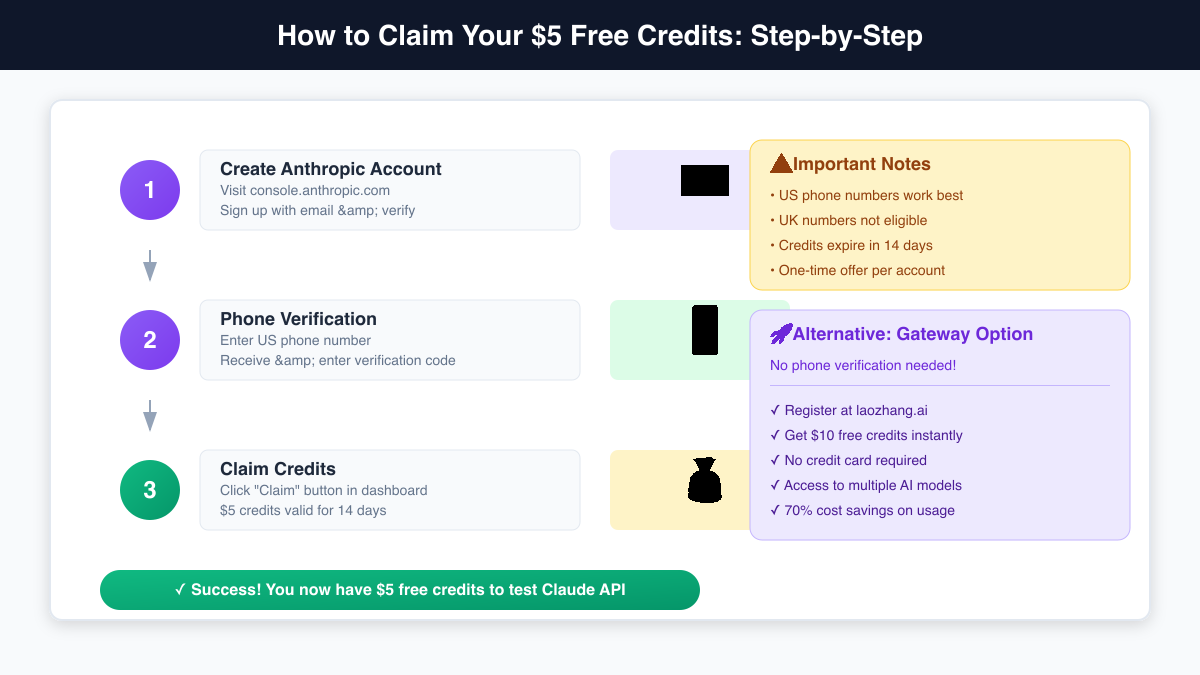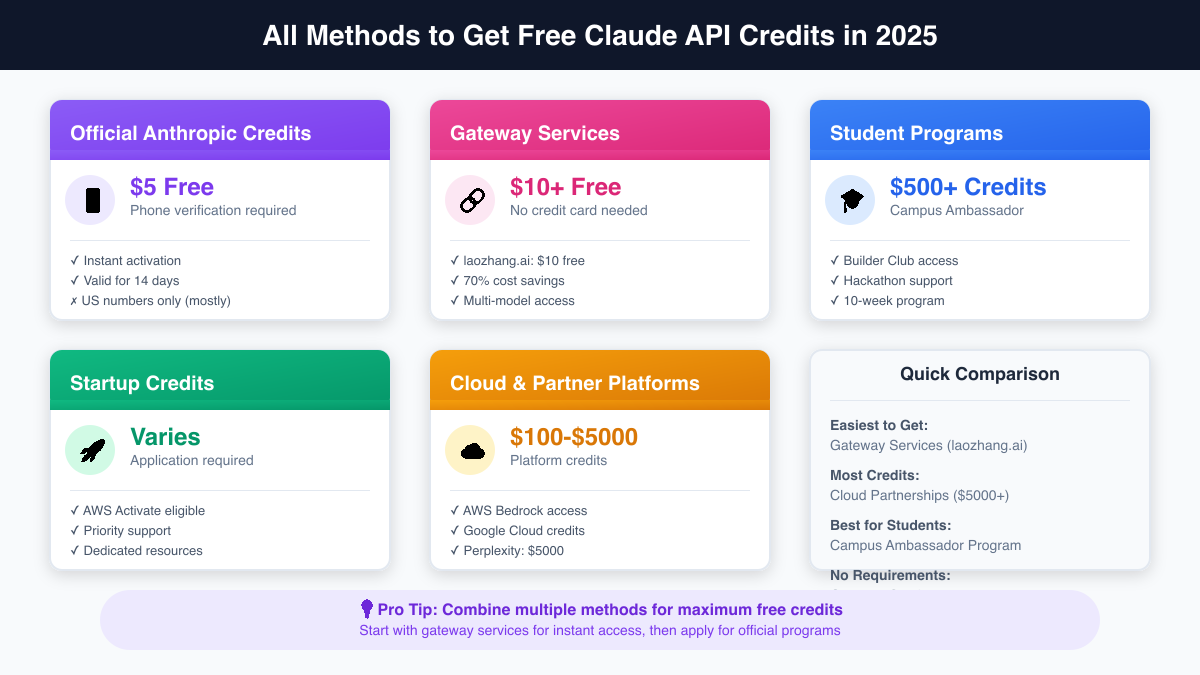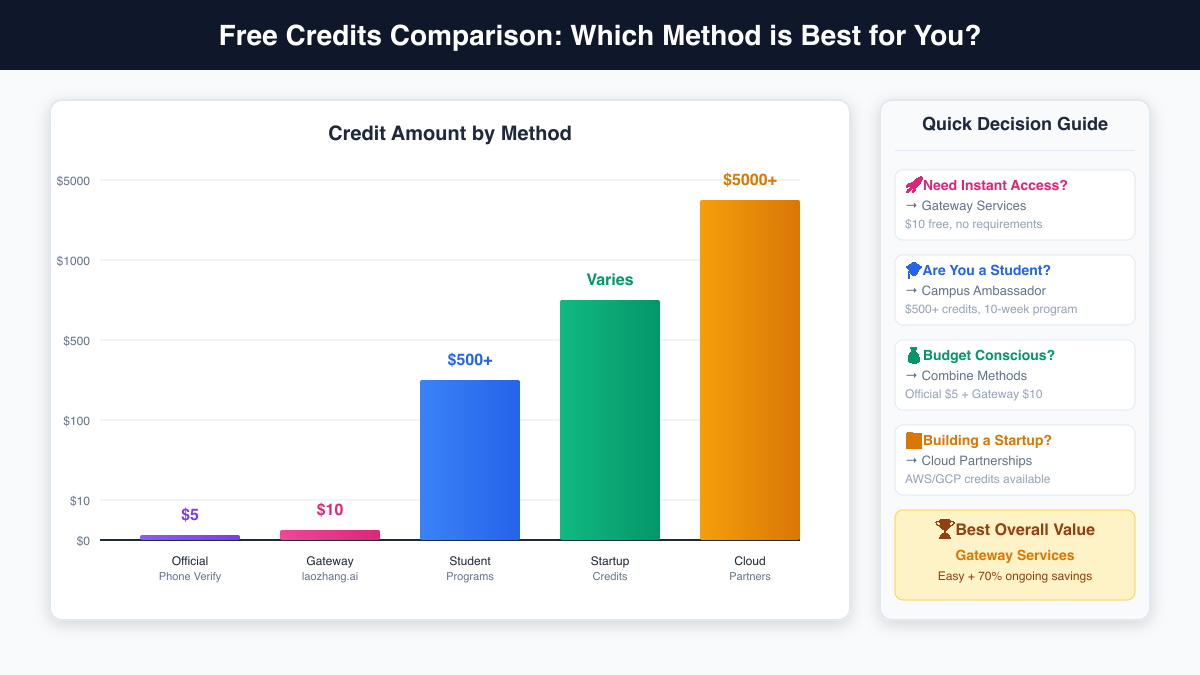The quest for free Claude API credits represents more than just cost savings—it's about removing barriers to AI innovation. In 2025, as Claude's capabilities reach new heights with the Opus 4 and Sonnet 4 models, the demand for accessible entry points has never been greater. This comprehensive guide unveils every legitimate method to obtain free Claude API credits, from the official $5 phone verification offer to partnership programs worth thousands of dollars.
Whether you're a student exploring AI for the first time, a startup founder validating an idea, or a developer seeking to experiment before committing resources, understanding these free credit opportunities can accelerate your journey. The landscape of free AI credits has evolved significantly, with new programs, partnerships, and alternative access methods emerging to meet diverse developer needs. This guide navigates through all options, helping you choose the path that best aligns with your circumstances and goals.
The Official Route: Anthropic's $5 Free Credits

Anthropic's official free credit program remains the most straightforward entry point for new developers. Upon creating a new developer account at console.anthropic.com, eligible users can claim $5 in free credits through phone verification. This modest amount, while limited, provides enough resources to process approximately 330,000 tokens with Claude 3.5 Sonnet or conduct meaningful initial experiments with the platform.
The process begins with standard account creation—email registration, password setup, and email verification. The critical moment arrives during the onboarding phase when the system prompts for phone verification. Here's where geographic limitations become apparent: US-based phone numbers consistently qualify for the offer, while UK numbers are explicitly excluded. Other regions face variable eligibility, making this method unreliable for international developers.
Once phone verification succeeds, a notification appears in the dashboard announcing the available credits. Clicking the "Claim" button immediately adds $5 to your account balance, valid for 14 days from activation. This expiration window creates urgency but also ensures genuine usage rather than credit hoarding. The credits apply to all API calls and Workbench usage, providing flexibility in how you explore Claude's capabilities.
The limitations of this official offer deserve careful consideration. The $5 credit translates to roughly 1,000 API calls with moderate prompt lengths—sufficient for initial testing but inadequate for serious development or production validation. The 14-day expiration means you must plan your experiments carefully to maximize value. Most significantly, this is a one-time offer per account, with no legitimate way to claim it multiple times without violating terms of service.
Gateway Services: The $10+ Alternative Path

API gateway services have emerged as powerful alternatives to direct Claude access, offering enhanced free credit packages alongside ongoing cost benefits. Services like laozhang.ai lead this category, providing $10 in free credits upon registration—double Anthropic's official offer—without requiring phone verification or credit card information. This frictionless onboarding removes the geographic barriers that limit official credit access.
The gateway model operates on aggregation economics. By pooling usage across thousands of developers, these services negotiate bulk rates with AI providers and pass savings to users. Laozhang.ai exemplifies this approach, claiming 70% cost reductions compared to direct API pricing. For developers planning sustained usage beyond free credits, this ongoing discount often outweighs the initial credit difference.
Beyond financial advantages, gateways provide technical benefits that enhance the developer experience. Unified APIs allow seamless switching between Claude, GPT, and other models without code changes. Built-in request queuing and retry logic handle rate limits gracefully. Geographic distribution ensures low latency regardless of your location. These features address common pain points in direct API usage, making gateways attractive even for developers who could access official credits.
The registration process for gateway services typically involves minimal friction. Using laozhang.ai as an example, developers provide basic information, verify their email, and immediately receive credits. No phone verification limits access, no credit card creates commitment anxiety, and no geographic restrictions exclude international users. This accessibility particularly benefits developers in regions where official credits remain unavailable.
Student Programs: Unlocking Educational Resources
Educational initiatives represent a significant source of free Claude API credits, with Anthropic's Campus Ambassador and Claude Builder Club programs leading the charge. These programs recognize students as future AI leaders, providing resources that far exceed standard free credit offers. Participants report receiving $500 or more in API credits, enabling substantial projects and research initiatives.
The Claude Campus Ambassador program targets student leaders ready to evangelize AI within their universities. Successful applicants commit to a 10-week program involving workshop organization, hackathon management, and community building. In exchange, ambassadors receive API credits for personal use and event distribution, Anthropic speaker access, and priority support channels. The program transforms individual benefits into community impact, multiplying the value of provided resources.
Claude Builder Clubs offer a lighter-touch alternative for students seeking credits without leadership commitments. These clubs, often organized by Campus Ambassadors, provide members with API credits for project work, educational workshops, and collaborative learning environments. Participation requirements vary by institution but typically involve regular attendance and project completion. The social learning aspect often proves as valuable as the credits themselves.
Beyond Anthropic's official programs, educational institutions increasingly negotiate bulk API access for their students. Universities with AI research programs or computer science departments may provide Claude credits as part of coursework or research support. Students should investigate whether their institution maintains such partnerships, as these often provide the most generous credit allocations with the least administrative overhead.
Startup and Developer Programs
The startup ecosystem benefits from multiple free credit opportunities, recognizing that today's experiments become tomorrow's unicorns. While Anthropic's official startup program details remain selective, numerous paths exist for founders to access Claude without upfront investment. These range from accelerator partnerships to cloud platform credits that include AI model access.
AWS Activate stands out as a particularly valuable program for startups seeking Claude access. Qualified startups receive AWS credits—often $5,000 or more—that apply to Amazon Bedrock, which includes Claude models. The application process requires a genuine business with a professional web presence and credible business plan, but successful applicants gain substantial resources. Similar programs exist through Google Cloud and Microsoft Azure, each offering paths to AI model access.
Developer-focused initiatives provide another avenue for free credits. Hackathon sponsorships frequently include Claude API credits for participants. Online coding platforms and AI communities occasionally distribute credits to active members. Developer relations programs at companies building on Claude may share credits with early adopters or beta testers. These opportunities require active engagement in the developer ecosystem but can yield significant resources.
The key to accessing startup and developer credits lies in presenting legitimate use cases. Programs seek founders and developers building real solutions, not those simply seeking free resources. A well-articulated project proposal, demonstration of technical capability, and clear value proposition dramatically improve approval chances. Many programs also prefer applicants who haven't previously received substantial credits, favoring fresh faces over serial applicants.
Cloud Platform Partnerships

Major cloud providers have recognized AI models as critical platform differentiators, leading to generous credit programs that include Claude access. These partnerships often provide the largest credit amounts available, though they come with platform lock-in considerations. Understanding each platform's offering helps developers maximize available resources while choosing appropriate architectural constraints.
Amazon Web Services leads with Bedrock integration, providing native Claude access within the AWS ecosystem. New AWS accounts receive various credit amounts through different programs—from $300 in standard free tier credits to $100,000+ through Activate for qualified startups. These credits apply to Bedrock usage, effectively providing free Claude access. The integration quality matches direct API usage, with additional benefits like VPC endpoints and IAM integration.
Google Cloud Platform offers Claude through Vertex AI, with new accounts receiving $300 in free credits applicable to AI model usage. While the initial amount seems modest, GCP's aggressive pricing for committed use and sustained use discounts can stretch credits significantly. Educational users may access additional credits through Google Cloud for Education programs, potentially reaching thousands of dollars in free resources.
Microsoft Azure's OpenAI Service doesn't directly offer Claude, but Azure credits can fund alternative AI models or be used for compute resources in hybrid architectures. The Azure for Startups program provides up to $150,000 in credits, which creative developers can leverage for AI workloads even without direct Claude access. This indirect approach requires more technical sophistication but can yield substantial resources.
Alternative Access Methods
Beyond traditional credit programs, creative developers have discovered various methods to access Claude's capabilities without direct API costs. These approaches range from legitimate platform features to clever architectural decisions that minimize or eliminate API expenses. While not technically "free credits," these methods achieve the same goal: Claude access without upfront payment.
Web-based access through Claude.ai provides unlimited free usage for individual users, though without API integration. Developers can prototype conversations, test prompts, and validate approaches before implementing API solutions. The free tier includes access to Claude Sonnet 4, offering substantial capabilities for experimental work. While manual and non-programmatic, this access helps developers understand Claude's capabilities before committing to API integration.
Development tools increasingly include Claude integration with free tiers. Cursor IDE offers 50 free Claude prompts monthly for coding assistance. Various Chrome extensions provide limited free Claude queries for writing and research tasks. These tools solve specific problems without requiring direct API access, potentially eliminating the need for credits in narrow use cases.
Open source projects building on Claude sometimes share API access with contributors. Documentation projects, research initiatives, and community tools may provide contributors with API credits for development work. This approach requires meaningful contribution but can provide sustained access for developers willing to give back to the community.
Maximizing Your Free Credits
Strategic usage of free credits can dramatically extend their value, turning limited resources into meaningful development progress. The key lies in understanding token economics and optimizing every API call for maximum impact. Successful developers treat free credits as learning investments, extracting insights that inform future paid usage rather than attempting production workloads.
Prompt optimization represents the highest-impact optimization strategy. Shorter, well-crafted prompts achieve similar results to verbose instructions while consuming fewer tokens. System prompts should be refined and reused rather than repeated in each call. Context should be carefully managed, including only essential information rather than dumping entire documents. These optimizations can reduce token usage by 50-80% without sacrificing output quality.
Model selection significantly impacts credit consumption. Claude 3.5 Sonnet costs 80% less than Opus while handling most tasks competently. Haiku offers even greater savings for simple operations. Matching model capabilities to task requirements prevents overspending on unnecessary intelligence. Many developers successfully complete entire proof-of-concept projects using only Haiku, saving premium models for final refinements.
Caching strategies prevent redundant API calls that waste credits. Storing successful responses for reuse, implementing request deduplication, and building local prompt libraries all reduce API usage. Development environments should use cached responses when possible, reserving live API calls for new explorations. This approach can extend $5 in credits to feel like $50 in effective value.
Common Pitfalls and How to Avoid Them
The pursuit of free credits creates temptations that can lead to account suspension or worse. Understanding common pitfalls helps developers maintain good standing while maximizing legitimate opportunities. The most frequent mistakes stem from impatience or misunderstanding of terms, both easily avoided with proper knowledge.
Multiple account creation ranks as the most common violation. Developers frustrated by the one-time nature of official credits may attempt to create additional accounts for extra $5 allotments. This practice violates terms of service and risks permanent bans from Anthropic's platform. The minimal additional credits rarely justify the risk of losing access entirely. Patient developers find legitimate alternatives provide better value than policy violations.
Misunderstanding credit expiration causes unnecessary losses. The 14-day window for official credits catches many developers unprepared, leading to expired credits and missed opportunities. Successful developers claim credits only when ready to use them, plan experiments in advance, and set calendar reminders for expiration dates. This preparation ensures maximum value extraction from time-limited resources.
Geographic workarounds through VPNs or borrowed phone numbers may seem clever but create more problems than they solve. These tactics violate terms of service and may trigger security reviews. Moreover, they often fail—Anthropic's verification systems detect and block suspicious patterns. Developers in ineligible regions find better success through gateway services than attempting to circumvent geographic restrictions.
Taking Action: Your Best Path Forward
Choosing the optimal free credit strategy depends on individual circumstances, technical requirements, and long-term goals. No single path suits everyone, but understanding all options enables informed decisions. The following framework helps developers select appropriate strategies based on their specific situations.
For immediate access without barriers, gateway services like laozhang.ai provide the fastest path to experimentation. The $10 free credit (https://api.laozhang.ai/register/?aff_code=JnIT ) exceeds official offers while removing verification requirements. The 70% ongoing discount makes this option attractive even after free credits expire. Developers needing quick starts or facing geographic restrictions find this path most suitable.
Students should pursue educational programs that provide substantial credits alongside learning opportunities. The Campus Ambassador program offers the highest credit amounts but requires significant commitment. Builder Clubs provide good middle ground for engaged students. Even without formal programs, students should investigate institutional partnerships that might provide access.
Startups and serious developers benefit most from cloud platform partnerships. While requiring more setup effort, these programs provide credits measured in thousands rather than dollars. The application process rewards preparation—polished websites, clear business plans, and technical credibility improve approval chances. These larger credit pools enable meaningful product development rather than mere experimentation.
For everyone, regardless of primary strategy, claiming the official $5 credit makes sense when eligible. This provides immediate resources while pursuing larger opportunities. Combining multiple approaches—official credits for initial testing, gateway services for development, and partnership programs for scaling—maximizes available resources throughout the development journey.
The landscape of free Claude API credits continues evolving, with new programs and partnerships emerging regularly. Successful developers stay informed through Anthropic's announcements, developer communities, and AI news sources. Today's experimentation with free credits lays groundwork for tomorrow's AI-powered innovations. Start with the most accessible option for your situation, then expand as opportunities arise. The barrier to AI development has never been lower—seize the available resources and begin building.
